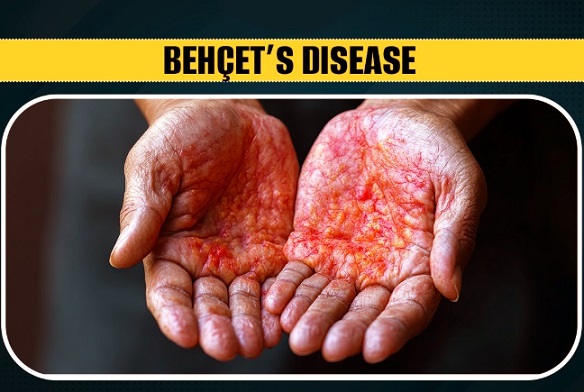Indonesian Doctors Warn That SARS-CoV-2 and HSV-1 Can Trigger Behçet’s Disease Involving Blood Vessel Inflammation
Nikhil Prasad Fact checked by:Thailand Medical News Team Jan 10, 2025 3 months, 3 days, 1 hour, 17 minutes ago
Medical News: In a groundbreaking revelation, researchers from Universitas Padjadjaran in Bandung, Indonesia, have highlighted the potential of SARS-CoV-2, the virus responsible for COVID-19, and Herpes Simplex Virus-1 (HSV-1) to trigger or exacerbate Behçet’s Disease (BD). This autoimmune condition, known for its unpredictable flare-ups and impact on multiple organ systems, is now being studied in the context of these viral infections, marking an essential step in understanding its etiology.
 Indonesian Doctors Warn That SARS-CoV-2 and HSV-1 Can Trigger Behçet’s Disease Involving
Indonesian Doctors Warn That SARS-CoV-2 and HSV-1 Can Trigger Behçet’s Disease Involving
Blood Vessel Inflammation
What is Behçet’s Disease?
Behçet’s Disease, first identified by Turkish dermatologist Hulusi Behçet in 1937, is a rare systemic vasculitis disorder characterized by inflammation of blood vessels throughout the body. The disease often manifests as painful oral and genital ulcers, skin lesions, and eye inflammation. Severe cases can involve neurological, gastrointestinal, and cardiovascular complications. It primarily affects individuals between the ages of 20 and 40, with a higher prevalence observed along the ancient Silk Road, particularly in Turkey, where the disease is most studied.
Although the exact cause remains elusive, Behçet’s Disease is believed to result from a combination of genetic predisposition and environmental factors. Notably, the HLA-B51 gene has been consistently associated with the disease. Viral infections, including HSV-1, have long been considered potential triggers due to their capacity to disrupt immune homeostasis.
Viral Triggers and Behçet’s Disease: A Closer Look
The study conducted by Dr. Fitrah Utari Bakti and Dr. Irna Sufiawati, both affiliated with the Faculty of Dentistry at Universitas Padjadjaran, dives deep into this connection. Through the detailed examination of three case reports, the researchers explored the clinical activity of Behçet’s Disease in patients with a history of SARS-CoV-2 and HSV-1 infections.
This
Medical News report examines these findings and their broader implications. The three female patients involved in the study, aged 29, 24, and 41, presented with classic BD symptoms, including painful oral ulcers, genital lesions, and eye redness. Of these, one patient had recently recovered from COVID-19, while the other two exhibited serological evidence of chronic HSV-1 infection.
Key Study Findings
The researchers utilized the Behçet’s Disease Current Activity Form (BDCAF) to evaluate disease activity in the patients. This tool measures symptoms across multiple domains, assigning a score based on their presence and severity.
-COVID-19-Associated Behçet’s Disease:
The first patient, a COVID-19 survivor, exhibited a BDCAF score of
4. Clinical manifestations included widespread oral ulcers, erythema in the oral cavity, and genital sores. Despite her active disease state, her BDCAF score was relatively low compared to the HSV-1 cases.
The researchers hypothesized that the patient’s recent SARS-CoV-2 infection acted as a triggering factor for BD rather than contributing to prolonged immune activation.
-HSV-1-Associated Behçet’s Disease:
The other two patients, with a history of recurrent HSV-1 infections, demonstrated higher BDCAF scores of 6 and 7, respectively. These patients showed more extensive and severe symptoms, including deep, painful ulcers and eye involvement.
Chronic reactivation of HSV-1 appeared to sustain systemic inflammation, exacerbating BD activity. Laboratory tests confirmed elevated levels of anti-HSV-1 antibodies, underscoring the persistent immune response to the virus.
-Comparison of Disease Activity:
The contrast in BDCAF scores between SARS-CoV-2 and HSV-1 patients suggests differences in the immune pathways activated by these viruses. While SARS-CoV-2 primarily induces acute inflammation, HSV-1’s role in Behçet’s Disease seems linked to its ability to remain latent and reactivate periodically, maintaining chronic immune dysregulation.
Managing Behçet’s Disease Amid Viral Infections
The treatment protocols for the three patients included a combination of corticosteroids, immunosuppressants, antivirals, and supportive therapies like antiseptic mouthwashes and multivitamins. All three patients showed significant improvement, though their clinical courses varied:
-The COVID-19 patient experienced rapid symptom resolution within a few weeks of initiating treatment.
-In contrast, the HSV-1 patients required more prolonged and intensive therapy, reflecting the chronic nature of their viral trigger.
Broader Implications of the Study
This research highlights the interplay between viral infections and autoimmune diseases. Understanding these connections is crucial for early diagnosis and effective management of Behçet’s Disease. The findings also underscore the importance of:
-Routine Screening: Patients with recurrent HSV-1 infections or a history of severe COVID-19 should be monitored for Behçet’s Disease symptoms.
-Multidisciplinary Care: Collaboration among oral medicine specialists, dermatologists, rheumatologists, and ophthalmologists is vital for comprehensive management.
-Personalized Therapy: Tailoring treatment to the specific viral trigger and patient’s disease activity can optimize outcomes.
Conclusion
The study findings offer valuable insights into the role of SARS-CoV-2 and HSV-1 in Behçet’s Disease pathogenesis. The findings indicate that while both viruses can trigger BD, their impacts differ in scope and severity. HSV-1’s chronic reactivation poses a more significant challenge than the acute inflammatory response associated with SARS-CoV-2.
These insights pave the way for further research into viral triggers of autoimmune diseases. Larger studies involving diverse populations and longer follow-up periods could enhance our understanding and lead to more targeted therapeutic strategies. Meanwhile, clinicians must remain vigilant, as early recognition and intervention can significantly improve patient outcomes.
The study findings were published in the peer-reviewed journal: International Medical Case Reports Journal.
https://www.tandfonline.com/doi/full/10.2147/IMCRJ.S487703
For the latest COVID-19 News, keep on logging to Thailand
Medical News.
Read Also:
https://www.thailandmedical.news/news/covid-19-increases-risk-of-mortality-even-beyond-the-acute-phase
https://www.thailandmedical.news/news/covid-19-causes-vascular-alterations-in-various-parts-of-the-body
https://www.thailandmedical.news/articles/coronavirus
